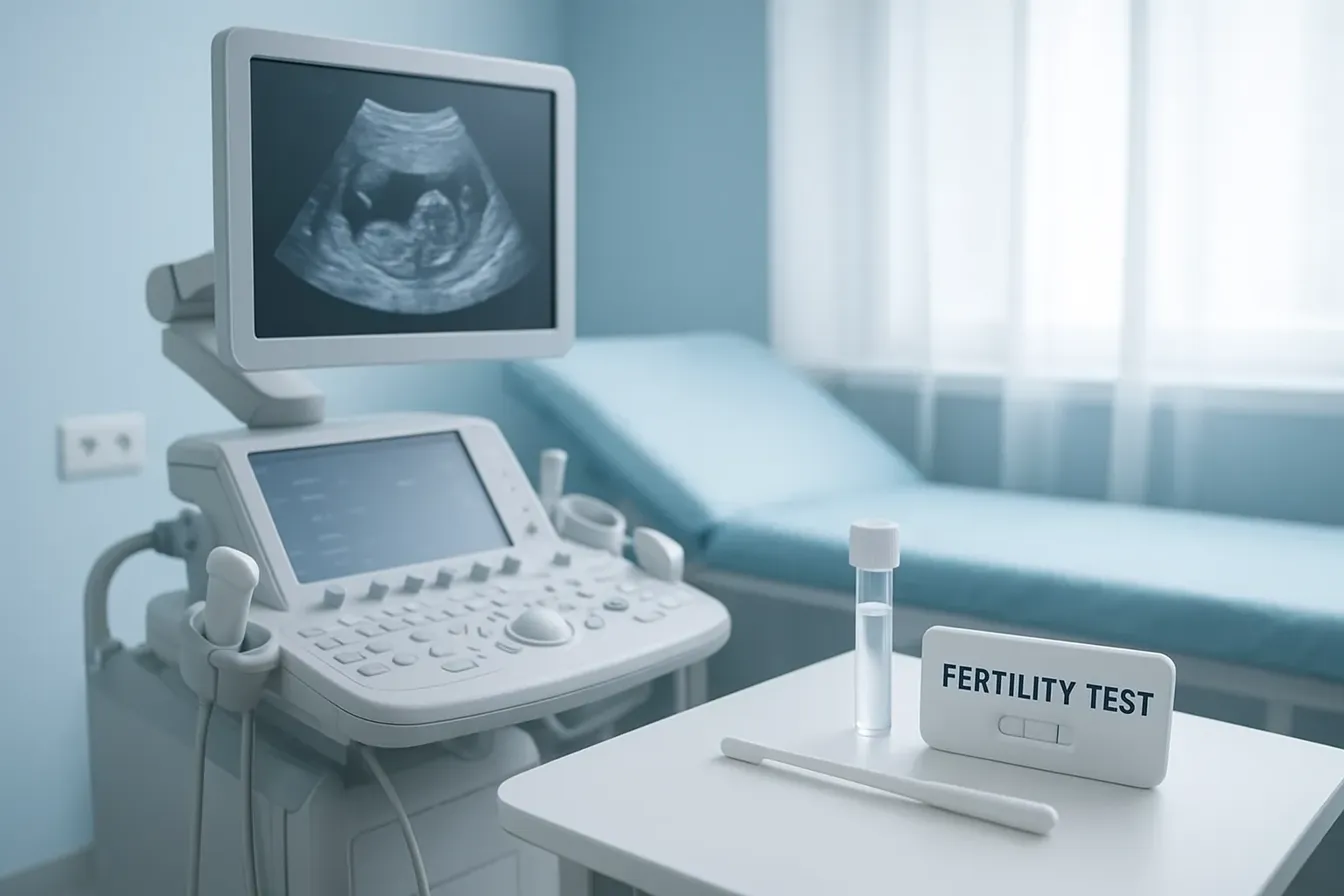Navigating Birth Control Choices: A Comprehensive Guide for Young Women

Embarking on the Journey to Motherhood Safely
Pregnancy is a transformative experience marked by profound physical and emotional changes. Ensuring the health and well-being of both mother and baby requires knowledge, preparation, and attentive care. This guide provides essential pregnancy care tips grounded in trusted medical research and expert recommendations to help expectant mothers navigate a healthy journey from preconception through postpartum recovery.
Prioritize Early and Regular Prenatal Care

Why is early and regular prenatal care important?
Early prenatal care is crucial as it allows healthcare providers to perform timely screenings and review the mother's health history, which helps detect potential issues early. This ongoing monitoring promotes the well-being of both mother and baby by enabling the management of pregnancy-related conditions and risks. Regular visits also support optimal fetal growth tracking and timely response to any health concerns. For more details, see Regular prenatal checkups.
How often should prenatal checkups be scheduled?
Prenatal visits typically start once a month during the first 28 weeks of pregnancy, increase to twice a month until 36 weeks, and then shift to weekly visits up to delivery. Women with high-risk pregnancies may require more frequent monitoring and tailored care. Learn more about Prenatal checkups importance.
Who provides prenatal care and what is their role?
Healthcare professionals involved in prenatal care include obstetricians, gynecologists, nurse practitioners, and certified nurse-midwives. They provide medical checkups, perform necessary tests, offer nutritional and lifestyle guidance, and support emotional health to optimize pregnancy health outcomes. See Prenatal care and tests for more information.
What tests and screenings are recommended during pregnancy?
Standard screenings involve blood tests to check Rh factor, hepatitis B, syphilis, HIV, rubella immunity, urinary tract infections, and Group B strep. Gestational diabetes testing is advised between 24 and 28 weeks, with earlier testing for women at higher risk. Ultrasounds and other imaging assess fetal development and detect structural anomalies. Additional details at Prenatal testing procedures.
How is fetal development monitored throughout pregnancy?
Healthcare providers track fetal growth through measurements of the uterus, fetal heartbeat checks, and ultrasound imaging. From the first trimester where major organ development occurs to the third trimester where growth accelerates, these assessments ensure the fetus is developing healthily. Learn more about Pregnancy tests and screenings.
How are high-risk pregnancies managed?
High-risk pregnancies require closer, personalized monitoring involving additional tests and more frequent prenatal visits. Providers develop tailored plans to address complications such as gestational diabetes, preeclampsia, or maternal age factors, ensuring both mother and baby are closely supported. For comprehensive guidance, see High-risk pregnancy care.
| Aspect | Details | Purpose |
|---|---|---|
| Early Prenatal Visits | Typically start between 8-10 weeks | Early detection of health problems (Prenatal care benefits) |
| Frequency of Visits | Monthly until 28 weeks, then biweekly, then weekly | Monitor ongoing maternal and fetal health (Prenatal checkup schedule) |
| Healthcare Providers | Obstetricians, midwives, nurse practitioners | Provide comprehensive prenatal assessment and support (Healthcare providers during pregnancy |
| Routine Tests & Screenings | Blood, urine tests, gestational diabetes test | Detect infections, immunity status, and metabolic conditions (Pregnancy screenings |
| Fetal Monitoring | Ultrasounds, heartbeat checks, abdominal measurements | Track growth and development of fetus (Fetal development monitoring) |
| High-Risk Management | More tests and visits, personalized care plans | Manage conditions like gestational diabetes or hypertension (High-risk pregnancy care) |
Nutrition and Supplementation for Optimal Fetal Development
What constitutes a healthy diet during pregnancy?
A healthy pregnancy diet is well-balanced, featuring plenty of fruits and vegetables, whole grains, lean proteins, and low-fat dairy. Healthy fats from sources like nuts and seeds support fetal brain growth. Caloric intake should be adjusted with an additional 340 calories daily during the second trimester and about 450 extra in the third trimester to support the baby’s growing needs. For detailed advice, see Nutrition During Pregnancy.
Why is folic acid supplementation important?
Folic acid is critical before and during pregnancy to protect against neural tube defects such as spina bifida. Taking 400 to 600 micrograms daily helps early development of the fetal brain and spinal cord. Prenatal vitamins typically contain this amount and are recommended to ensure adequate intake. Learn more from Folic Acid for Pregnancy and Prenatal Vitamins and Folic Acid.
What are the recommendations for fish consumption?
Eating between 8 to 12 ounces of low-mercury fish weekly, such as salmon, cod, and tilapia, provides essential omega-3 fatty acids that support fetal brain and eye development. However, high-mercury fish like shark, swordfish, king mackerel, and tilefish should be avoided due to potential risks to the baby. For more guidance, refer to Fish Consumption During Pregnancy.
What food safety measures should pregnant women follow?
To reduce risks of foodborne illness, pregnant women should avoid unpasteurized dairy products, raw or undercooked meats and seafood, deli meats unless thoroughly reheated, and raw sprouts. Good hygiene practices like washing hands and produce thoroughly and ensuring proper cooking temperatures are essential for safety. Recommendations can be found at Food Safety During Pregnancy and Food Safety in Pregnancy.
How much weight gain is recommended during pregnancy?
Weight gain guidelines depend on pre-pregnancy body mass index (BMI). Underweight women are advised to gain 28-40 pounds, those with a healthy weight 25-35 pounds, overweight women 15-25 pounds, and women with obesity 11-20 pounds. Weight should increase gradually over the trimesters to promote healthy fetal growth and maternal wellbeing. More details are available in Healthy Pregnancy Weight Gain.
Safe Physical Activity and Lifestyle Choices
How can exercise benefit pregnant women?
Regular, moderate-intensity aerobic exercise such as walking, swimming, or prenatal yoga offers multiple benefits during pregnancy. It helps enhance physical comfort by reducing common aches and swelling. Exercise lowers the risks of gestational diabetes and preeclampsia, two potential complications of pregnancy. Additionally, staying active prepares the body for labor and facilitates faster postpartum recovery. Physical activity also boosts mood and mental well-being, helping to manage stress and anxiety. For more on exercise during pregnancy, see trusted resources.
What exercise precautions should be observed?
Before starting or continuing exercise, pregnant women should consult their healthcare providers. They need to avoid activities with a high risk of falling or abdominal injury, such as contact sports or activities like horseback riding and skiing. Maintaining hydration by drinking plenty of water and avoiding overheating, especially during hot weather, are important precautions. Modifications to workout routines may be necessary as pregnancy progresses to ensure comfort and safety. Learn more about safe exercise in pregnancy.
What substances should be avoided during pregnancy?
Avoiding harmful substances is critical for fetal and maternal health. Smoking, alcohol, illicit drugs, and vaping must be completely avoided as they increase risks of miscarriage, birth defects, developmental delays, preterm birth, and sudden infant death syndrome. Even small amounts of alcohol can cause fetal alcohol spectrum disorders. Open communication with healthcare providers about any substance use is essential for effective management. See guidelines on managing drug and alcohol use during pregnancy.
Why is mental health important during pregnancy?
Mental health is a vital aspect of pregnancy wellness. Managing stress, anxiety, and depression positively affects both mother and baby. Techniques such as mindfulness, relaxation exercises, talking to trusted individuals, and seeking professional support when needed can significantly improve emotional wellbeing. Addressing mental health concerns early also reduces risk for postpartum depression. Learn more about mental health during pregnancy.
How important are hydration and rest?
Adequate hydration, typically 8 to 12 cups of water daily, is essential to support increased blood volume, amniotic fluid production, nutrient delivery to the fetus, and waste elimination. Proper hydration can also alleviate common pregnancy symptoms like swelling, fatigue, and constipation. Prioritizing rest and good sleep hygiene helps maintain physical health, boosts energy levels, and supports emotional balance during pregnancy. Taking naps or resting as needed is encouraged. For tips on hydration and rest in pregnancy, see reliable resources.
Vaccinations and Infection Prevention

Which vaccinations are recommended during pregnancy?
Pregnant women are advised to receive vaccines for influenza (injected form), Tdap (whooping cough), and COVID-19. These vaccines help protect both the mother and the baby from serious infections that could cause complications during pregnancy or after birth. For more details, see Recommended vaccinations during pregnancy and Vaccinations during pregnancy.
Are vaccines safe during pregnancy?
Vaccines like the flu shot, Tdap, and COVID-19 vaccines have been shown to be safe during pregnancy and are highly recommended. However, live attenuated vaccines, such as the MMR vaccine or nasal spray flu vaccine, should be avoided during pregnancy to prevent any risk to fetal health. Learn more at Pregnancy and vaccine safety and Safe medications during pregnancy.
How can infections be prevented during pregnancy?
Preventing infections is key to a healthy pregnancy. Pregnant women should practice good hygiene by washing hands regularly and handling food safely. They should avoid exposure to toxoplasmosis, commonly found in cat feces, by taking caution around litter boxes. Additionally, travel during pregnancy should be planned carefully with a healthcare provider’s advice to reduce risk. For guidance, see Preventative measures to avoid infections and Food safety during pregnancy.
What should pregnant women do if they contract illnesses like flu or COVID-19?
If a pregnant woman contracts flu or COVID-19, prompt medical care is essential. It is important to follow healthcare provider guidance for symptom monitoring and to receive treatments that are safe during pregnancy. Early management helps protect the health of both mother and baby. See more at Managing flu and COVID-19 in pregnancy.
Maintaining vaccination schedules and following preventive measures significantly lowers infection risks, contributing to a safer pregnancy journey. Additional resources on Pregnancy health information provide comprehensive support.
Recognizing Warning Signs and Preparing for Labor and Postpartum

What warning signs require immediate medical attention during pregnancy?
Pregnant women should seek emergency care if they experience severe headaches, blurred vision, chest pain, difficulty breathing, heavy vaginal bleeding or fluid leakage, reduced fetal movements, severe swelling, or fever. These symptoms can indicate serious complications and need prompt evaluation by a healthcare professional. For more information, see Recognizing Pregnancy Emergency Symptoms and Symptoms Needing Medical Attention in Pregnancy.
How can expectant mothers prepare for labor and postpartum?
Preparation involves creating a clear birth plan that outlines preferences and emergency contacts. Attending childbirth and newborn care classes provides essential knowledge and confidence. Preparing the hospital or birthing center bag with necessary items well in advance eases stress when labor begins. Learning breastfeeding techniques beforehand also supports a smoother postpartum period. Helpful resources include Pregnancy and Newborn Care Classes and Preparing for Labor and Delivery.
Why is postpartum care important?
Postpartum care focuses on monitoring physical recovery from childbirth and assessing emotional well-being through depression screening. It provides professional support for breastfeeding and addresses any complications early. Regular medical follow-ups during this period help ensure a healthy adjustment for both mother and baby. Learn more at Postpartum Care Visits and Support and Postpartum Care Essentials.
How does support impact pregnancy and postpartum outcomes?
Strong emotional and practical support from partners, family, and healthcare providers significantly reduces stress levels. This support boosts mental health, facilitates better coping mechanisms, and contributes to positive birth and recovery experiences. It also helps new mothers manage the demands of caring for a newborn effectively. Additional guidance can be found in Emotional Support for Pregnant Women and Mental Health During Pregnancy.
The Importance of Preconception and Personalized Pregnancy Care

Why is preconception care important?
Preconception care lays the foundation for a healthy pregnancy by allowing women to prepare their bodies and lifestyles ahead of conception. This includes taking folic acid supplements to reduce birth defect risks, managing chronic health conditions like diabetes or hypertension, quitting smoking and alcohol, and reviewing current medications with a healthcare provider. Early planning reduces risks such as premature birth and congenital disabilities, setting the stage for better maternal and fetal health outcomes.
How does personalized prenatal care benefit pregnancy outcomes?
Personalized prenatal care considers each woman's unique health profile—age, medical history, pregnancy risks—and tailors monitoring and interventions accordingly. This approach helps in early detection of potential complications such as gestational diabetes or preeclampsia. Women with high-risk pregnancies receive specialized attention and more frequent evaluations, contributing to healthier pregnancies and safer deliveries.
What role do healthcare teams play in pregnancy care?
Pregnancy care is best supported by a collaborative team, including obstetricians, certified nurse-midwives, nurse practitioners, and specialists. Modern care models utilize connected health systems with shared electronic records and remote monitoring tools to track blood pressure, blood sugar, and fetal heart rate. This team-based approach ensures continuous support across prenatal, delivery, and postpartum phases, enhancing care coordination and patient safety. Learn more about personalized pregnancy care.
How are disparities in pregnancy care addressed?
Addressing racial and health disparities involves clinician training to recognize and mitigate unconscious bias, expanding access to remote and in-person prenatal services, and actively partnering with diverse patient populations. Such efforts help reduce higher maternal mortality rates seen in marginalized groups, promoting equity in pregnancy outcomes.
Together, preconception optimization and personalized, equitable prenatal care improve pregnancy experiences and outcomes for all women.
A Holistic Approach to a Healthy Pregnancy Journey
Achieving a healthy pregnancy is a multifaceted endeavor that blends early medical care, balanced nutrition, safe physical activity, infection prevention, and emotional support. Beginning with preconception planning and continuing with attentive prenatal and postpartum care, each step influences the well-being of both mother and baby. By following established guidelines, communicating openly with healthcare providers, and embracing a supportive network, expectant mothers can navigate their pregnancy journey with confidence, ensuring the best possible outcomes for themselves and their newborns.





.png)